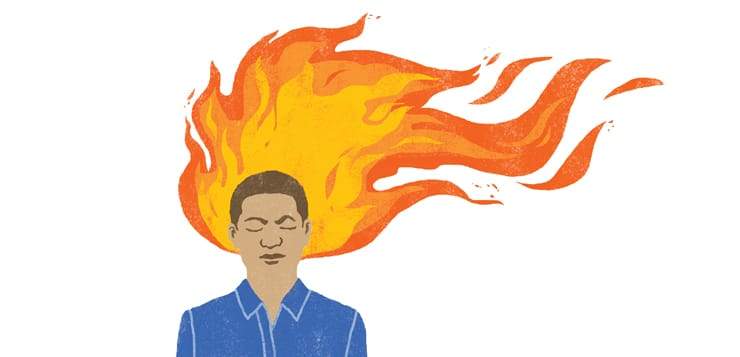My mother read somewhere that mindfulness could be damaging because it can trigger uncontrollable emotional trauma. She’s worried that I may be doing a practice that could harm my mental health. What can I tell her to reassure her?
Your mother obviously loves you very much and doesn’t want you to suffer, but I think she may be a little overprotective in this case. There is some very interesting research out of Brown University done by Willoughby Britton and colleagues, which has sought to understand the range of experiences of meditators, including looking more closely at difficult, challenging, and sometimes disruptive experiences that meditators have had. This is a complex topic, but suffice it to say that the vast majority of these unfortunate experiences have occurred in people meditating over long periods, in multi-day silent meditation retreats, and we still know very little about what led to these incidents. Adverse events like this are exceedingly rare in the more common mindfulness-based programs widely available.
There is nothing to be gained from forcing yourself to meditate or “pushing through” difficult feelings. Think of it as a “melting” process rather than a “mining” one.
That said, I don’t mean to totally dismiss the potential pitfalls of mindfulness practice. Sometimes, when people have difficult or extensive histories of trauma or abuse, meditation practice may put them in touch with those memories and emotions, and they can sometimes feel overwhelming, particularly at first. For this reason, if you have a history like this it’s wise to be working with a therapist while exploring the practice of mindfulness. The key here is moderation, patience, and a willingness to be kind to yourself. If you feel that a particularly challenging feeling or memory is growing too big or intense to bear, the most mindful thing you can do is to choose intentionally to disengage, focus on your breath, let go of the formal practice, and focus on sensations in the body or something outside yourself, like the view outside the window or across the room. These actions can give you an opportunity to emotionally and physically settle. There is nothing to be gained from forcing yourself to meditate or “pushing through” difficult feelings. Think of it as a “melting” process rather than a “mining” one.
Lately when I meditate, I find I’m uncovering deep anger. It’s uncomfortable. I’m not finding relaxation or peace. What should I do?
There are two parts to your question. The first one is how to work with anger when it arises in meditation and the second is more of an assumption that may need clarifying.
The challenge (and it is a huge challenge sometimes) is to see if we can be curious about the anger, to stay with it and see how it manifests—how it rises and falls, ebbs and flows in us as we stay aware of it. Admittedly, there may be pain involved, and that might call for some degree of kindness or self-compassion. Maybe placing a hand on your heart or in some other soothing place, feeling the warmth and kindness in the touch, and treating yourself the way you would treat a good friend. Maybe comforting or soothing yourself, saying a kind word to yourself like “Ouch! This is tough!” or just naming it “Ah! Anger is here. I’m feeling anger.” Oftentimes just assigning a label to feelings mellows the impact on the mind and the body.
As to not finding relaxation or peace, remember that song “I Never Promised You a Rose Garden”? Meditation is like that. We meditate to cultivate a different relationship with our inevitable human suffering, but it isn’t always easy or pleasant. The present moment can take so many forms, including difficult ones, but you can’t be any other place than where you actually are!
I see lights and other trippy images behind my closed eyelids when I meditate. What is that?
I think of them as brain secretions. Just like pretty much everything that our mind offers up randomly and without being invited, these experiences are simply rising phenomena without substance or meaning. I guess what’s happening is your optic nerve is used to being constantly stimulated and when it’s deprived it serves up its own entertainment (kind of like when your stomach gurgles when you’re hungry), but I prefer to just let go of needing to know why it’s happening and enjoy the show! My experience is that it’s a little bit like watching a lava lamp. Random, colorful, mesmerizing, and totally without significance.
These sensory phenomena can actually be a support to our practice. We can simply take a stance of observation, watching to see what happens next without knowing. A nonverbal observation task that allows us to stay present and not wander off into thinking. Pretty cool, and you didn’t need to buy an app to find a way to support your practice.






